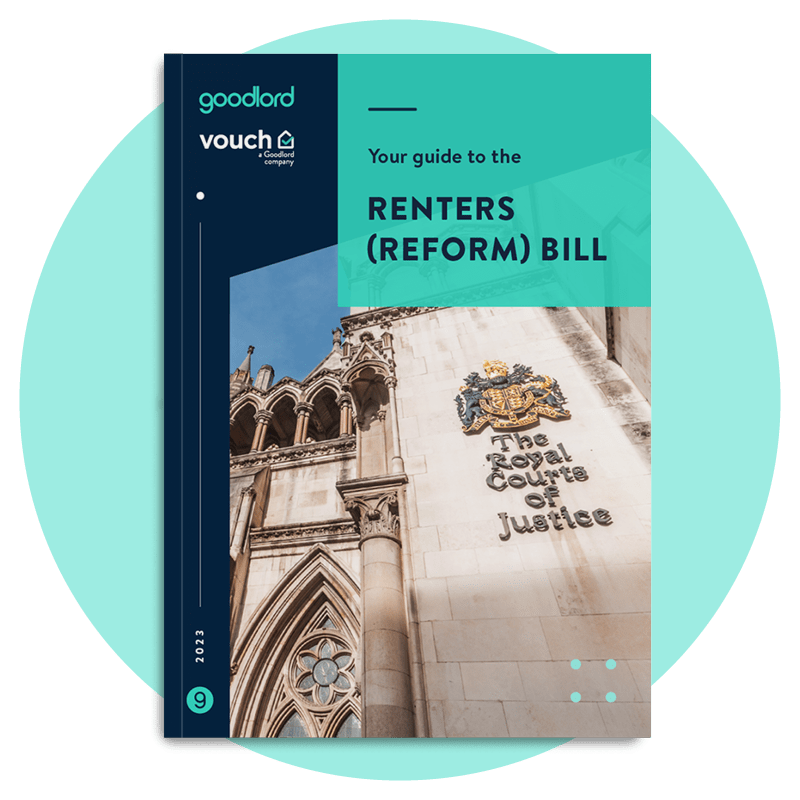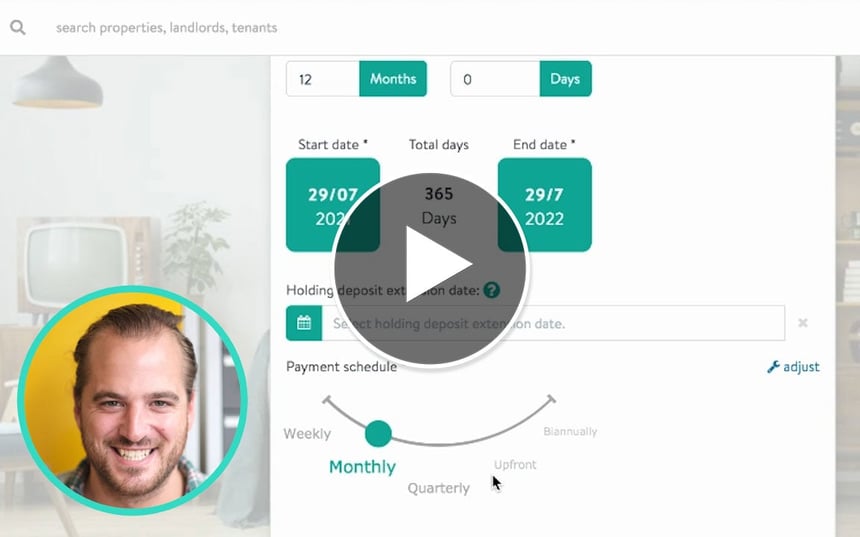Key lettings legislation and compliance dates for 2023 and beyond
From the Renters (Reform) Bill to changes for short-term lets and rent caps, landlords are going to need letting agents' guidance more than ever in 2023 when it comes to compliance.
With the Renters (Reform) Bill now here, landlords and agents alike will need to stay up to date on any further announcements around these proposals, with the second reading expected soon. Plus, the rent cap in Scotland is still ongoing, there are changes on the horizon for short-term lets and holiday homes, and further guidance on material information is expected this Autumn.
TBC: Second reading for the Renters (Reform) Bill (England)
Proposals for new lettings legislation in the Renters (Reform) Bill include abolishing section 21, strengthening section 8, and introducing a new ombudsman and property portal for landlords.
The government has introduced the bill to parliament, and we now await the date for the second reading in the House of Commons. You can download our free e-book on the bill or you can read our guide to the proposals in our blog.
1 October 2023: Deadline for existing short-term let operators and hosts to apply for a licence (Scotland)
Local authorities in Scotland need to have a licensing scheme in place for short-term lets, including Airbnb.
The deadline for existing hosts to apply for a licence on each property that they manage as a short let has been pushed back to 1 October 2023, giving those landlords an extra six months to prepare.
Any new operators will need a licence before they can welcome guests.
19 September to 16 October: Next government recess
The next break in government activities will be from the end of September to the mid-October to party conferences. This will only leave around three weeks after until the King's speech, to pass some of its remaining legislation or carry it into the next session.
7 November 2023: King's Speech
The first King's Speech for King Charles will take place on 7 November. This gives the government chance to share an overview on laws it aims to pass as well as its priorities for the coming months.
This will be the last parliamentary session before the general election which is expected in the first half of next year. Agents will need to listen out for any mention of the Renters (Reform) Bill to understand how that's been prioritised for the end of this year.
22 November 2023: Autumn statement from the Chancellor (UK)
The Autumn Statement shares an update on the government’s plans for the economy. With a general election looming for this government, Jeremy Hunt will likely continue to face calls from the industry to offer more favourable tax incentives for landlords.
31 March 2024: Expected deadline for the temporary rent cap to end (Scotland)
Although the rules currently state that the cap on rent increases in Scotland - set at 3% in most cases - will end in September 2023, this is expected to be extended to 31 March 2024.
However, the new Programme for Government has committed to introducing a system of long-term rent controls in Scotland.
The draft "A New Deal for Tenants" strategy shares some more detail on what this could look like - but more research is required to clearly define the approach the government will take.
You can read more about the current rent cap rules in our guide.
6 April 2026: Making Tax Digital for Income Tax Self Assessments (UK)
For landlords registered for Income Tax Self Assessments and with an annual business or property income above £50,000, income and expenses will need to be submitted digitally four times a year from 6 April 2026, and allowances and adjustments at least once a year, under Making Tax Digital.
For landlords with an income between £30,000 to £50,000 the deadline is April 2027. You can read more in our guide to the changes.
TBC: Parts B and C of guidance on material information in property listings (UK)
Back in May 2022, the National Trading Standards published guidance on part A of what material information should be included in property listings. This covered council tax, rent, and holding and security deposits.
Part B will cover information that's "established for all properties", such as utilities, while part C will cover extra information that may not be applicable to all properties, such as if a property is more at risk of flooding due to where it is.
We don't yet have timelines for when this guidance will be implemented through property portals. However, agents need to ensure they're keeping their database up to date with information that may be relevant, to avoid an admin headache when the rules come into play.
TBC: Increasing Minimum Energy Efficiency Standards (England and Wales)
Although an increase to minimum energy efficiency standards is awaiting government feedback from the consultation stage, it's expected that, from April 2025, all new tenancies for private rented properties will require an Energy Performance Certificate (EPC) rating of C or above, up from the current requirement of a band E rating.
From 2028, this increase will apply to all tenancies. This new legislation would also increase the capped amount that landlords would be required to invest to achieve the higher ratings, from £3,500 to £10,000.
TBC: Regulation of Property Agents (RoPA) (England)
The Regulation of Property Agents report proposed three top recommendations for property agents: a new and independent property-agent regulator, a Code of Practice, and minimum entry requirements and mandatory professional development.
Although many agents are starting to prepare now and achieve the expected qualifications, there is currently no date for when it will be introduced.
TBC: Making Tax Digital for Corporation Tax (UK)
A consultation on Making Tax Digital for Corporation Tax closed in March 2021.
Although there is no set date for when this will become law, estate agencies and landlords operating as a limited company will need to prepare for the digitalisation of their systems to submit their Corporate Tax returns and keep digital accounting records.
Past key lettings dates
1 June 2023: Deadline to issue written statements for converted occupation contracts (Wales)
The Renting Homes (Wales) Act 2016 has been in force since 1 December 2022. On that date, existing tenancy agreements converted to an "Occupation contract". Those contracts could initially be started verbally, but the written version of the contract will need to be shared with tenants by 1 June 2023.
6 June: Deadline to respond to the consultation on a short-term let register (England)
A consultation opened in April 2023 to seek views on the creation of a short-term let register in England. The proposals aim to "ensure England continues to provide safe and high-quality guest accommodation".
Landlords and letting agents have until 6 June to respond to the consultation, which will run alongside the consultation below around changing planning permission rules for short-term rentals.
7 June: Deadline to respond to the consultation on planning permission for short-term lets (England)
The consultation, closing on 7 June, outlines proposals to introduce new proposed rules for converting long-term rental properties or homes into short-term lets - and vice versa. The flexibility in how local authorities can apply these rules is also addressed in the open consultation.
30 June 2023: Changes to the Energy Price Guarantee (UK)
Until the end of June 2023, the Energy Price Guarantee will help the typical household in Great Britain save around £900 on their yearly energy bills - reducing the average bills to around £2,500.
1 April 2023: Changes to the rent freeze and moratorium of evictions (Scotland)
The Cost of Living (Tenant Protection) (Scotland) Bill 2022, including a rent freeze and moratorium on evictions, was introduced and backdated to 6 September 2022.
Originally planned until 31 March 2023, the rent cap will be extended for a further six months, until September 2023. However, the rent cap will be increased to 3% in most circumstances, or 6% to help landlords meet certain prescribed costs.
You can read more about the freeze and how it will change in our guide.
1 April 2023: Tax loophole on second homes to close (England)
Second homeowners that currently benefit from business rate relief on their second property will need to rent it out for a minimum of 70 days per year to continue to access the relief, rather than paying council tax, from April 2023.
The property will also have to be "available to rent" for a minimum of 140 days per year. You can read our guide for more details.
1 April 2023: First payments start to be due for Economic Crime (Anti-Money Laundering) Levy (UK)
The Economic Crime (Anti-Money Laundering) Levy will apply to businesses that are regulated for anti-money laundering (AML), including estate and letting agencies.
The levy will be charged based on companies that are regulated from 1 April 2022 to March 2023, meaning that the first payments will be due after 1 April 2023. It will be a fixed fee based on your agency's size.
Download your free anti-money laundering risk assessment template.
6 April 2023: Changes to Capital Gains Tax (UK)
The existing capital gains exempt amount is set at £12,300, meaning that, when a landlord sells a property, they will only start to pay tax on the profit if it's over £12,300.
However, from April 2023, that amount will drop to £6,000 - and then again to £3,000 from April 2024 - upping the amount of tax that landlords will pay if they plan to sell their property after this date.
1 December 2022: Renting Homes (Wales) Act 2016
Renting in Wales will change drastically from July 2022, when new rules for tenancy types and notice periods will be introduced, to "make it simpler and easier to rent a home".
Landlords will need to give their tenants 6 months' notice for no-fault evictions from this date, and will be unable to serve a no-fault notice in the first 6 months of the tenancy.
Read more about what will change in our guide to the new Welsh legislation, or read Ricky Purdy's advice on how to prepare your agency and landlords for the changes.
1 November 2022: Move to Making Tax Digital for VAT returns
VAT registered businesses will have to use Making Tax Digital compatible software to submit their VAT returns from 1 November 2022, when HMRC will switch off its current online system.
Agents will need to make sure that they have the right systems in place to continue to submitting their tax returns on time, to avoid any unnecessary fines or penalties.
You can read more about these changes - and the ones on the horizon for income and corporation tax - in our Making Tax Digital guide.
1 October 2022: New extended regulations on carbon monoxide and smoke alarms expected to come into force (England and Wales)
These regulations will now apply to social housing associations, and will extend carbon monoxide regulations to ensure there is an alarm in any room used as living accommodation with a fixed combustion appliance - excluding gas cookers - rather than solid fuel-burning combustion appliance as previously stated.
Landlords and agents will also need to replace or repair any faulty alarms reported by tenants "as soon as reasonably practicable." Read more about the changes in our guide to the extended regulations.
30 September 2022: End to Covid-19 adjusted right to rent checks (England)
The temporary measures to allow right to rent checks over video call and to share scanned copies or photos of documents rather than the originals have been extended to September 2022.
This is to give landlords and agents more time to prepare to choose and onboard the new Identification Document Validation Technology (IDVT) providers for use after 6 April 2022, as outlined above.
There is already a new digital process in place for EU, EEA, and Swiss citizens, who can access a share code to prove their right to rent, plus rules for B5JSSK nationals have also been confirmed.
Plus, to let your tenants know what to expect from the overall referencing process, you can download a free checklist to share with them.
31 May 2022: New material information in property listing rules (UK)
Landlords and agents will need to include certain material information in their property listings from the end of May 2022 onwards, including tenure (for sales listings), council tax bands, and sale or rent price of the property.
These fields will be in all portals by the end of May. If an agent or landlord were to leave those fields empty after that date, it would be flagged and "link to advice for consumers on why that information is important and how it may be obtained."
You can read more on the National Trading Standards site - or you can find out more about how to prepare for the changes in our blog and podcast with Sean Hooker, Head of Redress at the Property Redress Scheme.
10 May 2022: The Queen's Speech
The Queen’s Speech sets out the government’s agenda for the next parliamentary session. This includes outlining its plans to grow the economy, cut the cost of living, among other initiatives.
Traditionally, this has also been the vehicle the government has used to update the property sector on the status of existing legislative proposals, and announce plans for new legislation.
Whether or not it will include details of any further lettings legislation for 2022 remains to be seen.
You should take note of what's announced to ensure you keep your customers up to date on any changes that may affect them.
28 April 2022: Building Safety Bill receives royal assent
The Building Safety Bill will receive Royal Asset in April 2022. Once received, the government has laid out a transition plan to outline how it will prioritise each key element.
Some changes will take place in the first 12 months after Royal Assent - including changes to the Regulatory Reform (Fire Safety) Order 2005 which will clarify responsibilities in HMOs - while the bulk will come into force 12-18 months after - including new responsibilities for the "Accountable Person" when managing building safety risks in "occupied high-rise buildings".
15 April 2022: Consultation to close on "A new deal for tenants" (Scotland)
The Scottish government launched a consultation in December 2021 on proposals aiming to give tenants "stronger rights, greater protections against eviction and access to greener, higher-quality, more affordable housing".
The consultation will remain open until April 2022, and a final strategy is expected to be published by the end of the year.
6 April 2022: Right to rent rules will change to cover the new digital process for British and Irish citizens (England)
The government has announced that the rules will change from 6 April 2022 to allow the use of certified Identification Document Validation Technology (IDVT) providers to check the right to rent - both ID and eligibility checks - of British and Irish citizens on behalf of landlords and their agents.
6 April 2022: Biometric Residence Card / Permit holders will need to use the right to rent online checking service (England)
From 6 April, landlords and agents in England will no longer be able to check biometric residence cards or permits manually. Your applicants will need to prove their right to rent with a share code which you can then check via the online checking service.
1 April 2022: Energy price cap will increase (UK)
On 1 April 2022, the energy price cap will rise by 54%, affecting over 75% of households. This means an average £693 increase in energy bills to £1,971.
Estate and letting agents need to ensure you understand your tenants' financial situations.
You should also be prepared to support them with relevant information about the energy crisis, such as these free downloadable FAQ templates for your tenants and landlords.
1 April 2022: Making Tax Digital for VAT (UK)
As part of the government's plans to make HMRC "one of the most digitally advanced tax administrations in the world", all agencies or landlords registered for VAT will need to sign up to Making Tax Digital, and keep digital VAT records and use software packages to submit their VAT returns from April 2022.
Want the latest lettings new delivered straight to your inbox every week? Sign up to our mailing list and stay up to date.












